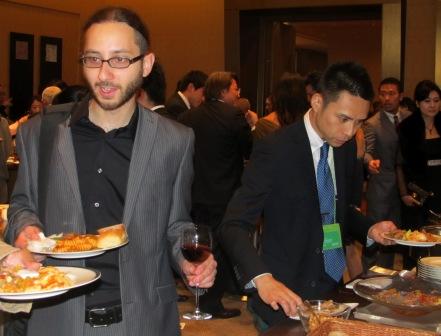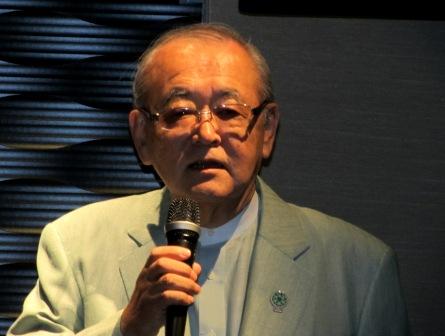
The buzz at the opening gala party of this year's Tokyo International Film Festival among journalists was whether the intensifying Japan-China conflict about the Senkaku Islands was going to affect the festival. Rumor had it that the ROC had asked the festival to withdraw the one Chinese film entry, Wang Jing's Feng Shui, from the competition program in retaliation for Japan's recent purchase of these desolate volcanic islets (with oil reserves nearby) in the East China sea. Yet a clip of the film was shown during the opening ceremony, as if all was proceeding as planned. Giving one of the opening speeches, Yukio Edano, Minister of Economy, Trade and Industry, made no mention of the conflict. Neither did any of the other political figures at the ceremony, which included various ministers in the Japanese government and United States senator Christopher Dodd.

I asked Festival Chairman Tom Yoda directly whether the escalating China-Japan conflict was causing problems for the festival.
He smiled affably, in his gentle way, and said, "Not at all." He did acknowledge that he
had been asked to withdraw the film Feng Shui, because of "friction between the two
governments," and that it was particularly one producer of the film who had urged its removal from the program. "But culture is culture. We already had the film in advance. We had a contract with them. We had 1332 entries for 15 competition slots, and we are going to show it." He was not worried about the Chinese reaction to his perseverance. It was a good thing to have cultural exchange, he said. He admitted that one other film from Hong Kong -- about a poor boy's rise to become a wealthy Chinese entrepreneur -- had, however, already pulled out earlier this fall, and would not be shown.

Tom Yoda, Chairman of TIFF
The worry about the China-Japan conflict was in the air from the moment I arrived from the airport. My first evening in Tokyo I happened upon a warm, intimate sushi bar in the Roppongi area, where a couple of jovial business colleagues -- a man and a woman -- welcomed me at the bar. We spoke all evening, the bowing elderly owner serving us sake (at least four different kinds) and his demure chef wife steaming fish, while a cuckoo clock chimed the hours and I speared fish soup balls with a chopstick. The topic of conversation: the businessman's worry about his upcoming trip to Shanghai. He showed me a map of the problematic islands on his iPhone. "Chinese feeling is not positive towards us."
Nevertheless, Wang Jing's Feng Shui screened this morning as planned. It began with conflict, not political at all, but marital. A viper wife is shown stroking her husband's leg with her toe, wanting to have sex with him, while he pushes her away; she is clearly too strong, too desirous. The next scene: the beautiful wife yelling at her sheepish husband to help pack the boxes for their imminent move to a new apartment. Even the moving men notice the henpecked husband, and offer their condolences for his mistreatment.
The movie engages us in its intimate scenes, with close-ups of the disturbed family members, including a maltreated mother-in-law. "Can you do it?" the wife says at one point, annoyed in bed, as her husband struggles with an erection.
The first half of the film showcases the feisty wife's selfish behavior, behavior which leads her husband to an affair -- and worse. The second half shows her comeuppance, a Chinese taming of the shrew, as it were. She is reduced from being a sock-seller to being a burden carrier and eventually loses that which emboldened her commanding behavior -- her sexy good looks -- due to poverty and hard work. She becomes, if not kind, chastened. We also see the effect of the marital history on the next generation, the angry moping son, who does not forgive his ever-striving mother for how she treated her husband.
Could the film, based on the eponymous novel, be a misogynist act of revenge on women who demand too much and emasculate their man? Alternatively, the film works as a universal moral tale, of how nasty selfishness, in all of us, can get curbed by fate (here poverty in industrial China), the importance of which is alluded to by the feng shui title.
I would have liked to ask the director, but he cancelled his attendance at the festival.
